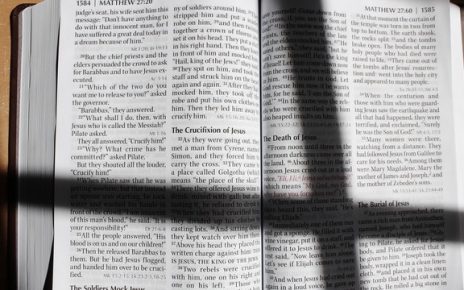By Xiaojing
I began to read the Bible since I believed in the Lord. From the Bible, I knew a lot of work that God had done before, such as Jehovah God’s creating the heavens and earth and all things, destroying the world with a flood, and burning Sodom, the Lord Jesus’ healing the sick and casting out the demons, feeding the five thousand with five loaves and two fish, and so on. Through reading the Bible, I was convinced that the Lord Jesus is the one true God who created the heavens and earth and all things. Since then, the Bible became the basis of my belief in God. I believed that all the words in the Bible were the words of God, that the Bible was a heavenly book, a holy book, and was sacred, containing no inaccuracies or errors, and that the writings of any great men could not compare with it. So reading the Bible became an essential part of my everyday life, and I did it day after day and year after year. One day, I accidentally discovered in the Bible some verses that give different accounts of the same thing. I was shocked: No! How could this be? How could there be discrepancies in the records of the Bible? Isn’t the Bible given by inspiration of God? It entirely comes from God! How could there be discrepancies in it? I thought my eyes must have been mistaken, so I read them again carefully. After reading, I found that the records are indeed different. I became confused. Later, I found the accounts of more matters inconsistent or contradictory in the Bible. The following are some examples.
The Record of Judas’ Death
Acts 1:18 records: “Now this man purchased a field with the reward of iniquity; and falling headlong, he burst asunder in the middle, and all his bowels gushed out.” But Matthew 27:5 records: “And he cast down the pieces of silver in the temple, and departed, and went and hanged himself.” Of the two verses, one says that Judas burst asunder in the middle, while the other says that he hanged himself. How did he die exactly? Which one of the two verses is accurate?
The Record of Peter’s Denying the Lord Thrice
Mark 14:30 records: “And Jesus said to him, Truly I say to you, That this day, even in this night, before the cock crow twice, you shall deny me thrice.” But John 13:38 records: “Jesus answered him, Will you lay down your life for my sake? Truly, truly, I say to you, The cock shall not crow, till you have denied me thrice.” These two verses record the same thing, but their accounts of Peter’s three denials of the Lord are different in time. If they were given by inspiration of God, there should not be any discrepancy between them.
Jesus’ Genealogy Created by Matthew
Matthew 1:1 and 16-25 record: “The book of the generation of Jesus Christ, the son of David, the son of Abraham. … And Jacob begat Joseph the husband of Mary, of whom was born Jesus, who is called Christ. So all the generations from Abraham to David are fourteen generations; and from David until the carrying away into Babylon are fourteen generations; and from the carrying away into Babylon to Christ are fourteen generations. Now the birth of Jesus Christ was on this wise: When as his mother Mary was espoused to Joseph, before they came together, she was found with child of the Holy Ghost. Then Joseph her husband, being a just man, and not willing to make her a public example, was minded to put her away privately. But while he thought on these things, behold, the angel of the LORD appeared to him in a dream, saying, Joseph, you son of David, fear not to take to you Mary your wife: for that which is conceived in her is of the Holy Ghost. And she shall bring forth a son, and you shall call his name JESUS: for he shall save his people from their sins. Now all this was done, that it might be fulfilled which was spoken of the Lord by the prophet, saying, Behold, a virgin shall be with child, and shall bring forth a son, and they shall call his name Emmanuel, which being interpreted is, God with us. Then Joseph being raised from sleep did as the angel of the Lord had bidden him, and took to him his wife: And knew her not till she had brought forth her firstborn son: and he called his name JESUS.”
The Bible says clearly that the Lord Jesus was conceived by the Holy Spirit, and that He and Joseph were not related by blood. The genealogy documented here is Joseph’s. How could it be the Lord Jesus’? When it speaks of the genealogy of the Lord Jesus, doesn’t it mean that He is a man, the son of Joseph, but not the incarnate God conceived by the Holy Spirit? For only man has his genealogy. God is not a member of the human race, so how could He have His genealogy?
These questions made me more and more puzzled. So I often prayed to God, “Oh Lord! How could there be discrepancies in the Bible? What’s this all about? Isn’t the Bible given by inspiration of God? Could there be mistakes in it? But, there are indeed contradictions in these verses! Oh Lord! I really can’t figure them out. May You enlighten and guide me to understand the mystery in them.”
The Lord Jesus is faithful. Just as He said: “Seek, and you shall find; knock, and it shall be opened to you.” He really heard my prayer. One day, I saw a passage of words in a book: “The Gospel of Matthew of the New Testament documents Jesus’ genealogy. At the start, it says that Jesus was a descendant of Abraham, the son of David, and the son of Joseph; next it says that Jesus was conceived by the Holy Spirit, and born of a virgin—which would mean He was not the son of Joseph or the descendant of Abraham, that He was not the son of David. The genealogy, though, insists on associating Jesus with Joseph. Next, the genealogy begins to record the process by which Jesus was born. It says Jesus was conceived by the Holy Spirit, that He was born of a virgin, and not the son of Joseph. Yet in the genealogy it is clearly written that Jesus was the son of Joseph, and because the genealogy is written for Jesus, it records forty-two generations. When it goes to the generation of Joseph, it hurriedly says that Joseph was the husband of Mary, words which are in order to prove that Jesus was the descendant of Abraham. Is this not a contradiction? The genealogy clearly documents Joseph’s ancestry, it is obviously the genealogy of Joseph, but Matthew insists that it is the genealogy of Jesus. Does this not deny the fact of Jesus’ conception by the Holy Spirit? Thus, is the genealogy by Matthew not a human idea? It is ridiculous! In this way, you know that this book did not come entirely from the Holy Spirit” (“Concerning the Bible (3)”). From this passage, I understood that the genealogy Matthew created for Jesus is not God’s will, but entirely is his own idea. How could God have His genealogy? Matthew knew very well Jesus’ conception by the Holy Spirit, but he created a genealogy for Jesus, saying that He is the seed of David, and the son of Joseph. Is this not a contradiction? Isn’t this denying Jesus’ conception by the Holy Spirit? Doesn’t it mislead people to think that the Lord Jesus is the son of Joseph—a man? This is opposing and blaspheming God!
At that time, I came to realize that there is inaccuracy in the verse, “All scripture is given by inspiration of God …” (2 Timothy 3:16).
What then are the other contradictions in the Bible all about? I went on to read the book and saw: “If the Four Gospels all came from the Holy Spirit, then why was it that Matthew, Mark, Luke and John each said something different about the work of Jesus? If you don’t believe this, then look at the accounts in the Bible of how Peter denied Jesus three times: They are all different, and they each have their own characteristics. … Carefully read the Four Gospels; read what they recorded about the things that Jesus did, and the words He spoke. Each account was, quite simply, different, and each had its own perspective. If what was written by the authors of these books all came from the Holy Spirit, then it should all be the same and consistent. Why then are there discrepancies? … After Luke and Matthew had heard the words of Jesus, and seen the work of Jesus, they spoke of their own knowledge, in the manner of reminiscences detailing some of the facts done by Jesus. Can you say that their knowledge was completely revealed by the Holy Spirit?” (“Concerning Appellations and Identity”). “What they recorded, it can be said, was according to their level of education and human caliber. What they recorded was the experiences of men, and each had their own means of recording and knowing, and each record was different. Thus, if you worship the Bible as God you are extremely ignorant and stupid!” (“Concerning the Bible (3)”).
As I read these words, I carefully pondered them. I understood that the Four Gospels are the records of the work of the Lord Jesus by His disciples. Just as Luke said: “For as much as many have taken in hand to set forth in order a declaration of those things which are most surely believed among us, Even as they delivered them to us, which from the beginning were eyewitnesses, and ministers of the word; It seemed good to me also, having had perfect understanding of all things from the very first, to write to you in order, most excellent Theophilus, That you might know the certainty of those things, wherein you have been instructed” (Luke 1:1-4). The Four Gospels were written by Luke and others according to what the preachers had said and what they themselves had heard and seen; the book of Acts is the accounts of Jesus’ disciples preaching His way. That is, the Four Gospels and the book of Acts are records of the things that had happened. Because they were written according to men’s memories and what they had heard from others, there are inevitably some errors in them. Men have thoughts, and therefore they have their own opinions and knowledge on many things. So, men’s work is unavoidably mixed with their subjective views. Thus, what they express in their work cannot be said to completely represent God’s will. For example, Matthew could write the genealogy for the Lord Jesus, which is sufficient to prove that there are impurities in man’s work. However, I regarded all the words in the Bible as the words of God, thinking that they were given by inspiration of God and entirely came from God. I am extremely stupid! I read the Bible every day, but I didn’t find that many words in it are records of men’s experiences and knowledge, and I even regarded it as a heavenly book, a holy book. Am I believing in God? Haven’t I regarded belief in the Bible as belief in God?
Through the enlightenment of the Holy Spirit, I came to understand that the author of the Bible is man, not God. If we regard belief in the Bible as belief in God, it is blasphemy against God. In that case, no matter how many sufferings we endure and how many prices we pay, God will not acknowledge our faith. Hence, in order to be approved by the Lord in our faith in God, the most fundamental condition is to treat the Bible correctly, and not to regard belief in the Bible as belief in God. The most important thing in faith in God is to put more effort into reading and practicing His words. If we believe in God but do not practice His words, even if we know the Bible back to front, we will not be acknowledged by God, much less enter into the kingdom of heaven, because the Lord Jesus plainly said to us “Not every one that said to me, Lord, Lord, shall enter into the kingdom of heaven; but he that does the will of my Father which is in heaven” (Matthew 7:21).
Thank the Lord for His enlightenment and guidance, so that I can know how to walk the path to follow Him in the future and how to pursue to be pleased by God. Thank God for His leadership. All the glory be to our Father in heaven. Amen!



